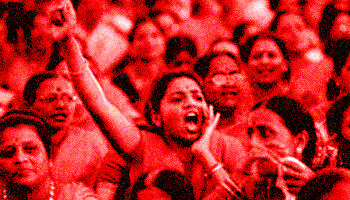As the pandemic abates there is perhaps no one more relieved than women. The pandemic intensified the attack against women which deepened under imperialist globalisation. It not only increased responsibilities for women at home, it further marginalised them in the workplace and in the labour market.
The necessary precautions to avoid the pandemic and the care work needed to fight it increased the home burden enormously. The virtual shutting down of the education system, especially at the school level, effectively brought the school home. Lack of resources to access smart digital devices and the internet further accentuated the problem. The draconian lockdown(s) which involved locking and boarding up of neighbourhood public parks and play grounds, such as they exist, added to the woes of already space constrained working class homes, while restrictions on mobility and absolute shutdown of public transport forced migrant workers to risk their lives and walk hundreds of kilometres from cities to their abodes in rural India.
The combined effect of all these restrictions gravely undermined access to healthcare, going beyond the coronavirus, as well as access to basic needs including food and essential services.
The most visible impact of this has been on women’s employment. Even before the pandemic, the unemployment crisis was at its worst in the last 45 years. Women were facing the brunt of it as more and more unemployed men competed for the jobs and pushed them out of the workforce. The pandemic only worsened the situation. As migrants were forced back to their villages, they competed for the limited days of work under MGNREGA alongside residents in rural areas, while in the cities they found themselves replaced by men at their workplaces. Over the course of past two years more women have been rendered jobless as compared to men and the gender pay gap has further widened.
India now has the special distinction of having the lowest female labour force participation rate in the entire sub-continent. This means that fewer women are in active wage employment or other gainful economic activity in India as compared to Bangladesh, Bhutan, Maldives, Pakistan and Sri Lanka.
During the pandemic women led the fight against the virus at the frontlines, being at the core of our healthcare system in overwhelming numbers working as Anganwadis, ASHAs, ANMs and nurses who not only held the healthcare system together at all levels during the past two years, but had to continuously wage militant struggles for better wages and safer working conditions. Women, in the vast numbers, have also kept the bare bones of the school system going through the limited digital medium. Majority of them have done so from tiny homes, locked in with their families, using their own electronic devices with extremely varied internet connectivity. In factories across the country, women worked shoulder to shoulder to ensure supply of medicines, personal protective equipment and packaged foods enabling us to fight the pandemic.
More women than we can count or whose work will ever be acknowledged have been at the frontline of the fight against COVID.
It is not just women’s work that has been in the shadows. Women, across class in residential spaces small and big, have faced violence and abuse of an untold proportion as men have been locked in at home and faced uncertainty, insecurity and a challenge to their masculinity!
The violence against woman has been further aggregated by an increasingly belligerent society and polity divided through religious chauvinism, bigotry, casteism, racism, parochialism and patriarchy and growing economic inequality all together forming the platforms that launch prejudice and hate on society.
Adolescent women in families ascribing to the Islamic faith have been targeted and dragged into the fight for a belligerent majoritarian hindutva on the question of hijab or the head scarf. The autonomy of women and their agency is under severe attack while, the girl child has been made the object of prejudice and hate by the patriarchal society. Macabre sexual crimes against woman have not just gone unchecked. They have been met with silence by those who hold the highest elected offices in our country.
Just as here in India, across the world women have fought for their rights at home, in society, in the workplace and in the polity on their own. This is not just a woman’s fight. The struggle for a fair, just and equitable society is not the struggle of women alone. This is a struggle for both men and women to advance. We in the NTUI have always believed this.
On this International Women’s Day we reaffirm our commitment to a united struggle by women and men in search for a just and civilised society. There is no other way forward.

